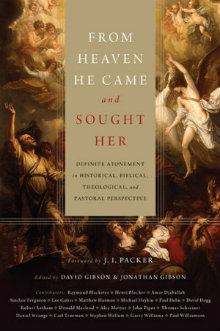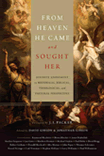Top Ten Books of 2013 - #2
January 2, 2014 1 CommentFrom Heaven He Came and Sought Her: Definite Atonement in Historical, Biblical, Theological, and Pastoral Perspective, edited by David Gibson & Jonathan Gibson (Wheaton: Crossway, 2013), 703 pp.
No, I haven’t yet read all 703 pages (actually, 667 of written text), but I’ve read enough to rejoice that a volume like this is now available to the body of Christ. What a monumental achievement this is! And why was such a book even necessary? In his Foreword, J. I. Packer provides the answer: “as the Reformed faith and its pastoral corollaries is the true intellectual mainstream of Christianity, so the belief in definite, particular, and sovereignly effectual redemption . . . is its true intellectual center” (13). Keep reading...

From Heaven He Came and Sought Her: Definite Atonement in Historical, Biblical, Theological, and Pastoral Perspective, edited by David Gibson & Jonathan Gibson (Wheaton: Crossway, 2013), 703 pp.
No, I haven’t yet read all 703 pages (actually, 667 of written text), but I’ve read enough to rejoice that a volume like this is now available to the body of Christ. What a monumental achievement this is! And why was such a book even necessary? In his Foreword, J. I. Packer provides the answer: “as the Reformed faith and its pastoral corollaries is the true intellectual mainstream of Christianity, so the belief in definite, particular, and sovereignly effectual redemption . . . is its true intellectual center” (13).
The contributors to this volume and the topics they cover are extensive, but some that are of special note include Paul Helm (writing on Calvin’s view of definite atonement), Carl Trueman (on John Owen), Thomas Schreiner (who addresses “problematic texts” for definite atonement in the pastoral and general epistles), Sinclair Ferguson (on the assurance of salvation), and John Piper (who writes on “preaching the fullness of definite atonement to the glory of God”).
There are 23 chapters that cover not only the full range of biblical instruction on this subject but also the most important theological, historical, and pastoral issues as well. The final chapter by Piper is itself worth the price of the book. There are two themes in particular that Piper addresses that I want to highlight. The first concerns how one preaches a universal and sincere gospel offer in the light of Christ having died as a substitutionary sacrifice for the elect alone. The second issue is Piper’s response to the views of Bruce Ware and Mark Driscoll, both of whom advocate a universal or unlimited atonement and both of whom are friends of Piper.
It isn’t easy to interact critically with those who are your friends and colleagues in ministry. Piper does it with great care and precision. He exposes the biblical, theological, and logical errors in the so-called “unlimited limited” view of the atonement but with a gentleness and respect for those who defend it. He is particularly helpful in responding to the arguments of Gary L. Shultz, Jr., one of Bruce Ware’s former doctoral student. Shultz argues that only an unlimited atonement makes it possible for us to preach a sincere and universal gospel. Piper counters by insisting that “only particular redemption can account for a fully biblical, universal gospel offer. The fullness of Christ’s achievement on the cross can be offered only if it has been fully achieved. And only definite atonement expresses the fullness of that achievement” (658). The way in which Piper makes this case is a model of careful and thoroughly biblical thinking.
As noted above, this is a “big” book, both in terms of its size and the biblical insight it brings to bear on our understanding of the nature and extent of Christ’s sufferings. Don’t be intimidated by it. Eat it in small bites. Savor the taste. Digest it slowly. You’ll enjoy the feast!

1 Comment
j david gilliland Jan 4, 2014 @ 10:02 am
The importance of "Particular redemption" or "Definite Atonement," designations I prefer rather than "Limited Atonement" (although saying the same thing), in the end is so critical not so much for what they say about the extent but the nature of the atonement and the principle of representative headship and the doctrine of imputation. If you try to defend a universal atonement, you or your students will ultimately deny its substitutionary nature. And if you deny the imputation of Christ's righteousness to His people as an accomplished fact, so too will you or your students deny the imputation of Adam's sin to those for whom he was the representative head.
Look at the sad error trail of New England theology: Beginning with Jonathan Edwards' son and following step-by-step in successive students, first particular redemption was denied, then came a governmental theory of the atonement, and ultimately the promotion of the social gospel theory by Edwards Amasa Parks. That is why A.A. Hodge would ultimately write that a denial of particular redemption is, "The first step in the easy decent of error."
Write a Comment
Comments for this post have been disabled.